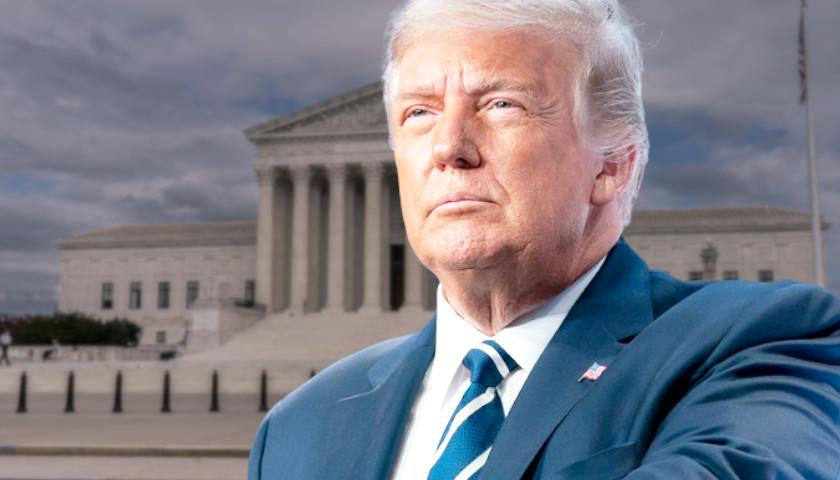by Joseph Weber and Natalia Mittelstadt
Supreme Court justices on Thursday appeared skeptical during oral arguments of Colorado plaintiffs’ assertions that former President Donald Trump should be kept off of the state’s ballot for president.
The justices focused on the consequences of allowing Colorado to remove former President Donald Trump during oral arguments on Thursday, pressing the Colorado plaintiffs’ attorney on the issues that could occur across the country.
Oral arguments began Thursday before the Supreme Court in the Trump v. Anderson case about whether the state can decide that Trump is ineligible to be on the Colorado ballot in this year’s presidential election under the insurrection clause of the 14th Amendment.
Chief Justice John Roberts said to the Colorado plaintiffs’ lawyer, Jason Murray, that “other states may have different views about what constitutes insurrection.” If ‘insurrection’ is defined differently by various states, then “we’d have to develop rules for what constitutes an insurrection,” Robert said.
If Colorado’s ruling is upheld, then removing Trump from the ballot would, “In very quick order, I would expect, although my predictions have never been correct, I would expect that a goodly number of states will say whoever the Democratic candidate is, you’re off the ballot, and others for the Republican candidate, you’re off the ballot,” Roberts speculated.
If this were to occur, then the presidential election would be determined by “just a handful of states,” Roberts said. “That’s a pretty daunting consequence,” he added.
Murray said that the Supreme Court could define what constitutes an ‘insurrection.’
Justice Ketanji Brown Jackson also pushed back against Murray, asking that if Section 3 of the 14th Amendment applies to presidents, then why didn’t Congress “put the word ‘president’ in the enumerated list in Section 3?”
She added, “they were listing people who were barred, and ‘president’ is not there. And so I guess that just makes me worried that maybe they weren’t focusing on the president.”
Murray argued that this issue came up in congressional debates regarding the amendment, with a senator saying that the president was included because it falls under an office of the United States. Jackson noted that this pointed to the ambiguity of the insurrection clause.
She later asked Murray, “If we think that the states can’t enforce this provision, for whatever reason, in this context — in the presidential context — what happens next in this case? I mean, is it done?”
Murray said that if the court decided that Colorado didn’t “have the authority to exclude President Trump from the presidential ballot on procedural grounds, I think this case would be done.
“But I think it could come back with a vengeance because ultimately members of Congress may have to make the determination after a presidential election if President Trump wins about whether or not he’s disqualified from office and whether to count votes for him under the Electoral Count Reform Act,” Murray added.
Justice Elena Kagan also seemed skeptical of allowing Colorado to keep Trump off of the state ballot in her questioning of Murray.
“I think that the question that you have to confront is why a single state should decide who gets to be president of the United States. In other words, you know, this question of whether a former president is disqualified for insurrection to be president again, is, just say it, it sounds awfully national to me,” Kagan said. “So whatever means there are to enforce it would suggest that they have to be federal, national means.”
Trump’s lawyer argued on Thursday before the Supreme Court that Trump shouldn’t be barred from the Colorado presidential ballot because only Congress can prevent an elected candidate from taking federal office under the 14th Amendment’s insurrection clause.
Trump’s legal counsel, Jonathan Mitchell, argued that a state cannot prevent Trump from being on a ballot regarding the insurrection clause of the 14th Amendment because Congress would have to prevent an elected candidate from taking federal office.
“A state cannot exclude any candidate for federal office from the ballot on account of Section 3, and any state that does so is violating the holding of term limits by altering the Constitution’s qualifications for federal office,” Mitchell said.
Justice Clarence Thomas, who is the most senior justice and known for usually being quieter during oral arguments, asked Trump’s attorney whether Section 3 of the 14th Amendment of the Constitution is self-executing, and if it is, if the states had any role in it, in addition to Congress’ role.
Mitchell said that the section isn’t self-executing, and that it’s up to Congress to execute the section.
The arguments are centered on a provision in the 14th Amendment that preventing those who “engaged in insurrection” from holding office.
Those who want to keep Trump off ballots say he incited the “insurrection” on Jan. 6, 2021, at the Capitol, in Washington, D.C., as congressional lawmakers were trying to certify the results of the 2020 election that he lost.
Mitchell began his argument by asserting that Trump wasn’t an “officer” as stated in the Constitution when he was president. An “officer” is an appointed official, not an elected one, the attorney argued.
Trump’s lawyers lost a case Tuesday on immunity in such matters when a federal appeals panel ruled their client can face trial on charges he plotted to overturn the 2020 election. That case could be taken up by the Supreme Court, the wire service also reports.
The high court has not been involved in the presidential election since Bush v. Gore in 2000.
The case before the high court is an appeal of the Colorado Supreme Court ruling that Trump should be disqualified because of his efforts to overturn his loss in the 2020 election, culminating in the Jan. 6 riot.
– – –
Joseph Weber comes to JusttheNews after covering national politics for Fox News since 2011. Natalia Mittelstadt graduated from Regent University with Bachelor of Arts degrees in Communication Studies and Government.





